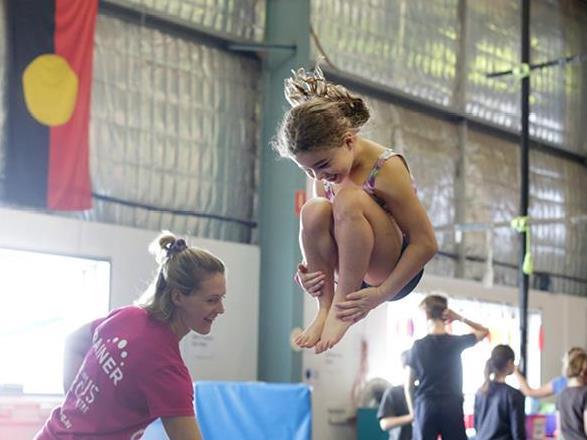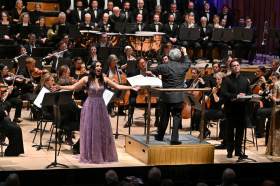A participant at Cirkidz; image supplied.
The positive benefits of young people’s participation in the arts have been further demonstrated by studies conducted in Western Australia and South Australia.
Research conducted by the University of South Australia, examining the experiences of 55 participants (aged 8-14 years) in Cirkidz’s Tweenz program, showed young people’s engagement with circus arts show resulted in significant improvements in four areas of mental wellbeing: stress relief, self-esteem, confidence and socialisation.
‘Children reported that circus training helped them feel much better about themselves, both physically and mentally,’ said lead researcher, UniSA’s Dr Richard McGrath.
‘They felt a greater sense of freedom, confidence and happiness, far less worry and stress than when they first started the program and reported feeling brave and proud of their achievements.’
McGrath said the study highlights the importance of supporting positive mental health initiatives from childhood in order to ensure lifelong societal and economic benefits.
‘The early and middle years of childhood are pivotal for positive cognitive development throughout life, resulting in healthier societies. Healthier societies can mean a reduction in lifestyle-related illnesses and can potentially reduce our reliance on healthcare resources. Furthermore, healthier societies have been shown to be more economically productive,’ said McGrath.
‘Given that about half of all serious mental health issues in adulthood begin before the age of 14, we should be considering more initiatives that focus on this younger age bracket.’
Greater investment in circus arts would not only result in healthier societies but would also have economic benefits in the long term, McGrath added.
‘Our research shows that for every dollar invested for a child in a circus training program, seven dollars are potentially saved in their future mental health costs,’ he explained.
‘Australia’s national spending on mental health is around $9.1 billion, making any savings amid an ever-tightening public purse especially timely.’
Read: Value of the arts demonstrated in new Australian study
In related news, 48% of participants in the Gecko Ensemble program, a West Australian theatre program for children aged five to 17 have reported it has had a positive effect on their anxiety levels.
The study, conducted by arts research agency Patternmakers in in association with Barking Gecko Theatre, found that confidence, teamwork, expressing creativity and being able to connect with others were the most significant outcomes nominated by the surveyed participants.
The research also found that the support and encouragement participants receive within the program makes them feel their voice is valued and they have an important contribution to make to the community.
Established in 2015, the Gecko Ensemble program was created for young people to have a safe space to find their voice and explore their creativity. Ensembles are led by professional Teaching Artists who approach children as equal collaborators, underpinned by a strong teaching ideology overseen by BGT’s Honorary Scholar, Professor Robyn Ewing AM, a world leader in Arts Education.
Barking Gecko Theatre’s Artistic Director Luke Kerridge said, ‘Our Gecko Ensembles are about learning performance skills, story-telling and improvisation, without the pressure of professional practice. There are no big productions, no assessments and no right and wrong. We are not running a “talent” school and our participants may not even necessarily want to be an actor one day. These workshops are about tapping into young people’s inherent creative potential and developing transferable skills that will help their interpersonal relationships, not just a future career in the performing arts.’
One of the key pieces of feedback from students and parents alike was the impact of having a place in which to ‘play’ – one of the key values of Barking Gecko Theatre.
Based on the positive outcomes from the report, Barking Gecko will continue to advocate for the role of the arts in young people’s lives and explore future evaluation opportunities to build on the research.
The full report is available at barkinggecko.com.au/ensembles/.




